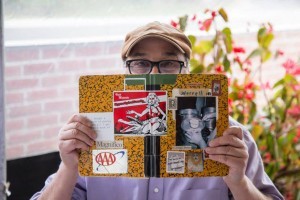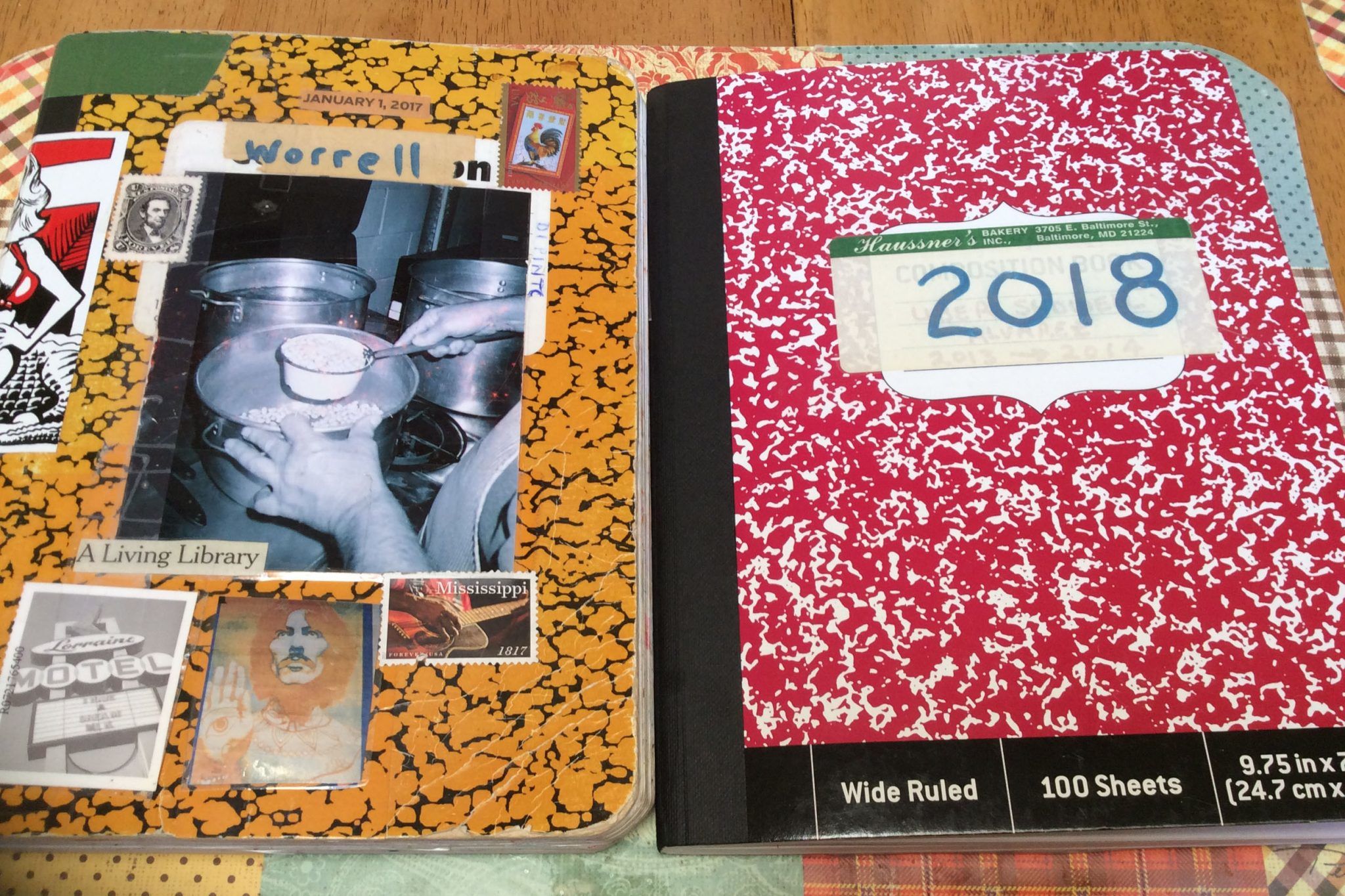New Year/New Journal
“Bellow gets Nobel Prize, I win $24.25 in poker.” — Bernard Malamud journal entry, October 21, 1976
For the past 40 years or so — from about the time Malamud was crying in his poker chips — I have kept a personal journal. My grandmother’s old china closet, which now stands alongside a stained-glass window installed in her memory, overflows with them.
“Notebooks,” sang David Byrne, the Arbutus boy. “What good are notebooks?”
To my mind, they are better than photo albums for sparking the quick into the dead. Mine are the marble composition type – black, red, blue, orange, yellow, green; each dedicated to a calendar year.

Inevitably, the entries have kept pace with my own transformations. From pages of teenage delirium in a large, urgent scrawl after nights of riding around in somebody’s father’s car — getting high, listening to “Ziggy Stardust,” asking girls if they want to go to the dance – to, decades later, my own Malamudian observations of literature’s fickle fortunes.
This from 1997, late October when I still worked the City Desk at The Baltimore Sun: “A well-respected editor took me to lunch today to get me to re-engage with the job. She asked what stories I wanted to write.
“I told her that a few months earlier, sick with a late summer stomach flu, I had been visited by Anne Frank – emaciated, naked, dying of typhus, covered with a blanket and glowing like a saint and that for two weeks afterward I believed in the deepest part of my soul that I had become one with the vision.
“I told her that I shared the experience with an Orthodox rabbi from Park Heights Avenue and the rebbe said to me, ‘You were Anne Frank for two weeks and you didn’t tell me?’”
This was not unlike McCandlish Phillips – once a star New York Times reporter turned Christian zealot, well remembered in my journals — hounding his editors for the chance to write about a circus clown named Otto Griebling, in whom Phillips saw something transcendent.
Phillips said his bosses “never responded to the idea.” Which is how my Anne Frank proposal was handled. The next day I was back on the late rewrite shift writing captions about a tanker truck colliding with a station wagon in Curtis Bay.
Each year there are always a few pages for whatever superstar has passed – like William Saroyan in 1981 – of whom I knew not before stumbling upon their obituary. Last week’s entry began with a transcription of a remembrance of Aharon Appelfeld, with whose work I have long been acquainted.

About a decade or so ago (and I’m not sure why), something both new and very old began to appear in my journals, which had long ceased to be diaries of activity and became more like collage-driven workbooks, the handwriting becoming smaller with each passing year, things clipped from the paper taped into the margins.
The volumes became crammed with overheard dialogue – both profound and inane, for this is Baltimore; ideas for fiction [“Elvis Presley Wins the Nobel Peace Prize”]; interviews with those I considered too important for a standard reporter’s notebook [Kate Hennessy, Johnny Winter] and quotes transcribed from periodicals, like this too-close-to-home entry from the New York Review of Books about Carson McCullers: “She was susceptible to sudden, ill-advised infatuations…”
This is the wrinkle — referenced above as both old and new — that has imbued the chronicles with a gravity that random thoughts, however important they seem at the time, cannot provide.
At my family’s traditional New Year’s Day meal of cocido – a Spanish peasant stew – I pass around the journal for the new year, its pages unblemished until I hand it, turned to the first page along with a pen, to my father.
Dad signs – just his name, seldom more — and passes it to my mother, who often puts “That’s all folks!” and a smiley face under her name before passing it to my brother (Danny, the cook) and on around the table it goes. My cousin Donna always adds a bit of sepia-tinged nostalgia for the good things she fears are endangered.
Bittersweet chestnuts await when I search for an idea vaguely remembered from journals long deposited in the china closet: The signatures and well-wishes – for health, for happiness, for peace — of those no longer with us, a simple schoolbook transformed into a tome of blessed memory.
I wish I had begun the practice before so many loved ones passed away: My Italian grandmother (she of the china closet, legally blind, learned to trace her name for official documents), Mr. Steve the seaman from Spain whose cigar ashes might have dusted the page, Agnes Karcz Garayoa, who grew up in a Depression-era tavern in Fells Point and made a great pot of crab soup.
But there’s a happy angle to this, as well, for one cannot (at least not yet), ring out the old without ringing in the new.
Last year, my brother Danny’s grandson – then four-years-old – signed his name with the help of his mother: DAWSON in big, shaky letters, the sort of kiddie script favored by toy stores. This year, the boy needed no help, his signature rendered with control, each letter pretty much the same size as the one before it.
So, here’s to the calendar of snow white, wide-ruled sheets at hand and hopes that the fates allow each of us to be present for the blank pages that await a dozen months down the road.
Rafael Alvarez is the author of Basilio Boullosa Stars in the Fountain of Highlandtown. He can be reached via orlo.leini@gmail.com





